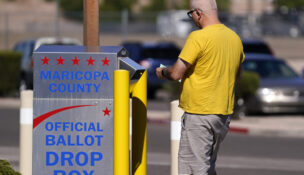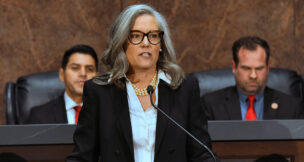Lawmakers form bipartisan housing/homelessness caucus
Jakob Thorington Arizona Capitol Times//January 16, 2025//
Lawmakers form bipartisan housing/homelessness caucus
Jakob Thorington Arizona Capitol Times//January 16, 2025//
A bipartisan group of legislators announced the creation of a housing and homelessness caucus dedicated to finding common ground on housing policy this session.
One mission for the group – pass the Arizona Starter Homes Act.
“The starter home bill is what we need to get done,” said House Majority Leader Leo Biasiucci, R-Lake Havasu City, during a Jan. 15 press conference announcing the formation of the caucus. “The reason why we created this caucus is to make sure to get as many voices as possible into a room from all sides of the aisle.”
Biasiucci and Sen. Analise Ortiz, D-Phoenix, have emerged as leaders of the caucus. Both members also played key roles in negotiations of last year’s version of the Starter Homes Act, which was controversial because many city leaders worried the bill wouldn’t lead to more affordable homes being built.

The Starter Homes Act proposed prohibiting zoning regulations intended to create houses with smaller lot sizes. It also would have prohibited new developments from requiring property owners to be forced into homeowners associations.
Cities largely opposed the measure in 2024, and it was met with a veto from Gov. Katie Hobbs who cited public safety concerns with the measure.
Hobbs made a commitment to lawmakers during her State of the State Address on Jan. 13 to continue working on housing measures.
“We must further cut the red tape that’s driving up the cost of housing,” Hobbs said. I’m proud of the progress we’ve made expanding access to casitas and building duplexes and triplexes in our downtowns. But Arizonans are depending on us to find more common sense solutions that don’t expose our neighborhoods to untested experiments.”
The governor had three other key housing goals: extending the state’s low-income housing tax credit, regulating short-term rentals and doubling the number of first-time homebuyers who receive assistance through the Arizona Is Home program.
Biasiucci said the housing caucus is hoping to work with the League of Arizona Cities and Towns and Hobbs’s office to find an agreement on the Starter Homes Act. The caucus will be meeting regularly through the session and has extended invitations to the Governor’s Office.
“We can bring together experts, advocates and policymakers to develop comprehensive solutions to ensure every individual has access to safe and stable housing,” Ortiz said. “It is unacceptable that in the wealthiest nation in the world, millions of people are struggling to find affordable housing and are forced to live on the streets.”
The league also plans to run a Starter Homes Act bill. Nick Ponder, the league’s legislative director, told the Arizona Capitol Times in a text that the league’s bill will likely focus more on reduced lot sizes and making affordable units a conditional right.
“There was nothing in their bill last year that required the homes to be starter homes. Nothing that required them to be affordable,” Ponder said. “In fact, nothing that required them to be purchased by an individual so you could have corporations owning more homes which is one of the root causes of the problem today.”
No version of the Starter Homes Act has been filed for the 2025 session yet. Biasiucci said it’s possible that the caucus files its version of the bill after discussions on the issue.
Another purpose of the caucus is to consider other housing measures and help lawmakers workshop their bills.
Sen. Catherine Miranda, D-Laveen, introduced SB1043, which would require cities with more than 75 people experiencing homelessness to have at least one shelter bed for every four people that are unhoused.
Miranda said she’s confident she can get Republicans and Hobbs to support her measure, although Biasiucci said he wasn’t sure if he could since he hasn’t read her measure yet.

“Each of us kind of grabs a layer, a piece on this problem,” Miranda said.
Another lawmaker who attended the Jan. 15 press conference is Rep. Selina Bliss, R-Prescott. Bliss has filed several bills during her time as a legislator seeking to regulate short-term rentals, but none have been heard in committee hearings yet.
This session, Bliss has introduced HB2131, which would require an online marketplace to verify that an owner of a short-term rental is in compliance with Arizona licensing and insurance requirements.
Republican leadership at the Legislature has been resistant to regulating short-term rentals since then-Republican Gov. Doug Ducey signed a law in 2016 that prohibits cities and towns from regulating short-term rental properties.
Some cities like Scottsdale and Sedona have pointed to short-term rentals as contributing factors to local housing issues. Biasicucci said he expects the league to run a short-term rental bill this session.
Some Democrats have said short-term rentals aren’t as significant of a problem to Arizona’s housing market compared to other issues. Ortiz previously told the Arizona Capitol Times that short-term rentals make up a small percentage of the housing stock and while it can be an issue for some specific cities, it’s not going to be the key to finding affordable housing in the state.
“We won’t agree on everything, but by forming this housing and homelessness caucus, we can amplify the voices of those who are most affected by these issues and advocate for the areas where we do have common ground,” Ortiz said.


















